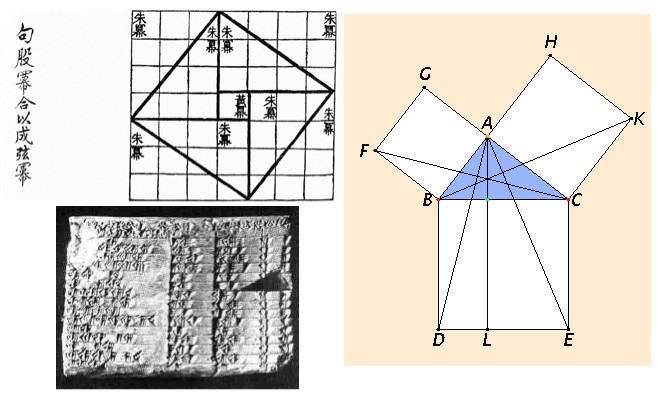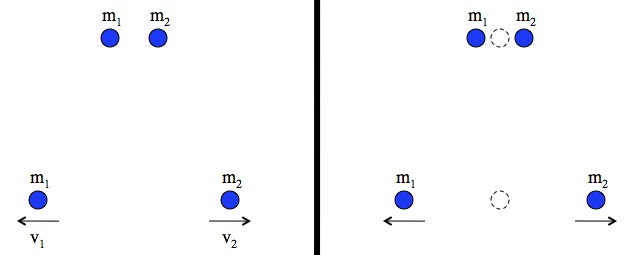Some things have a way of
being figured out over and over. For example, the Pythagorean theorem got
itself figured out in China, Greece, India, and Babylonia (Iraq).

Lower left: The Plimpton tablet, which lists
Pythagorean triples, is from ancient Babylonia (modern-day Iraq). Upper left: a
derivation of the Pythagorean theorem from ancient China (modern-day China).
Right: the derivation of the Pythagorean theorem as seen in Euclid's Elements
from ancient Greece.
However, there’s a fair chance that old school mathematicians were just copying each other. Specifically, Pythagoras probably stole “his” theorem from the Egyptians (Discoveries aren’t named after the first person to make them, they’re named after the last). Still, it’s the sort of thing that’s so useful and easy to prove that it’s hard to imagine an advanced culture not knowing about it.
And some ideas are just
good. We can say it’s very likely that aliens have invented hammers, because people (in every culture), several other varieties of apes, several monkeys species, otters (cutest), and others have all done
it. However, being a good idea doesn’t mean that different people/things will
create exactly the same thing. For example the Old World (Europe, Africa, Asia)
and Incan abacuses are subtly different.

These devices, the Yupana and Abacus, which were
developed independently and served the exact same function, have very different
forms. (Yupana beads not shown)
Point is, there are
almost certainly going to be commonalities. At the same time, things like the
Goldbach conjecture (every even number can
be expressed as the sum of two primes), or half of the more obscure theorems in
the more obscure mathematical disciplines, are unlikely to be in alien
textbooks. Math, being an infinite science, is going to have plenty of twists
and turns that only one civilization figures out, and many more that none figure
out.
Which mathematical things are most likely to be common is the sort of question best left to sci-fi writers, and other experts (such as there are).
Ultimately the physical predictions each of our sciences make will be the same. Because of, you know: reality. Physics is just a mathematical and philosophical structure that describes the universe. What’s very surprising (or, alternatively, very not surprising) is that you can describe (predict) the same physical laws and behaviors based on very different (one might even say; “alien”) premises.
For example, Newton’s first and third laws (“inertia” and
“for every action there’s an equal and opposite reaction”) are essentially
statements about the conservation of momentum. That is, if you total up the
momentum (mass times velocity) of a closed system, then the total momentum
remains constant forever. Now, you can mumble something about Lagrangians or
reference frames, but when you boil it down, conservation of momentum is just
something we take as true (because it always, always works).
But an alien might have a different way of approaching the same set of laws. Rather than saying “for a given system, if you multiply the velocity of each object with the mass of each object and add them all up you get something that never changes” (conservation of momentum), that E.T. might say something like “for a given system, the center of mass never accelerates”. Same laws, different intuition.

Left: Normally we describe Newton's laws in terms of
momentum, P = m1 v1 + m2 v2, which never changes. In this case P=0. Right:
Another way to describe the same results is in terms of the center of mass never
accelerating. In this case the center-of-mass' velocity is zero, and will stay
that way. It turns out that, mathematically, these are interchangeable, but the
philosophy is a bit different.
Like the abacus/yupana and big-rock/hammer parallels, these different theories do exactly the same thing, but look pretty different.
So (pressed for an answer), I’d expect that no matter how alien an Alien is, whether non-social, immortal, hive-minded, slug-based, whatever, their physics and math has to do a lot of the same stuff ours does, and may even be understandable (to our non-hive minds). At the very least, our physics and Alien physics has to describe the same universe. So, while they may have a completely different approach, it should look familiar, and ultimately do the same stuff.
Ask a Mathematician / Ask a Physicist
댓글 없음:
댓글 쓰기